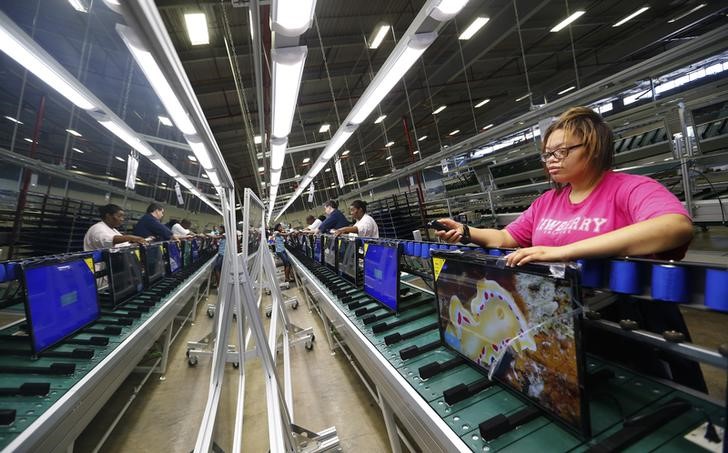By Ross Finley and Ian Chua
LONDON/SYDNEY/NEW YORK (Reuters) - Business activity weakened in China and Japan in April and growth slowed in Europe and the U.S., suggesting the global economy may be less robust than policymakers are predicting.
In China, where the government has been engineering a rebalancing of its economy towards domestic spending and away from reliance on exports of manufactured goods, the preliminary purchasing managers' index (PMI) fell to a one-year low of 49.2 from 49.6, according to data from HSBC/Markit. Economists polled by Reuters had expected it to remain steady.
An index reading below 50 suggests contraction in the sector.
Analysts at Japanese bank Nomura said the Chinese data underscored their forecast for two more 50 basis point cuts in the reserve requirement ratio for Chinese banks, and three more 25 basis point interest rate cuts this year.
The People's Bank of China cut its requirement for the amount of cash banks must hold as reserves by a full percentage point on Sunday.
Hopes of yet more stimulus have helped sparked a massive rally in the Chinese share market. The CSI300 index (CSI300) of the largest listed companies in Shanghai and Shenzhen has risen over 30 percent so far this year.
The Markit/JMMA preliminary Japan PMI for April also slid, to 49.7 from 50.3, as new orders continued to shrink and manufacturing production fell for the first time since July 2014. The data showed an increase factory hiring, however.
At next week's policy review, the Bank of Japan is expected to hold off on expanding its already massive monetary stimulus but may lower its inflation forecasts.
EUROPE AND U.S. FACTORY ACTIVITY SLOWS
A sudden drop in the euro zone flash composite Markit Purchasing Managers' Index (PMI) was driven by sharply slower growth in manufacturing orders in Germany and France, suggesting recent optimism about the euro zone may be overdone.
Markit's euro zone composite PMI fell to 53.5 from 54.0, below both the 54.4 consensus and the lowest forecast in a Reuters poll.
This marks the first major euro zone indicator that has disappointed all forecasts in quite some time, and comes just a month after the European Central Bank began purchasing government bonds to stimulate the economy.
Factory order growth slowed particularly in France, but also in major exporter Germany, the euro zone's No. 1 economy, suggesting more subdued activity ahead.
Both the flash manufacturing and services PMIs for France and Germany fell below the lowest forecast. For the euro zone, only the service PMI didn't.
"There is a clear risk that the composite PMI falls further as concerns about the situation in Greece and a possible euro exit intensify, raising the threat of a renewed economic slowdown in the euro zone," said Jessica Hinds, European economist at Capital Economics.
Other economists said the smaller euro zone economies that were hit so hard by crisis are still likely to report improvement in the months ahead.
"Country data so far available suggest that the periphery did comparatively well, with a good probability that the PMIs there may show resilience when they (are) published in early May," noted Marco Valli, economist at Italy's Unicredit (MILAN:CRDI).
In Britain, whose economy has performed better than the euro zone over the past several years, retail sales fell unexpectedly in March, hit by the biggest slump in fuel sales in just under three years, separate data showed on Thursday.
Growth in the U.S. manufacturing sector slowed more than expected in April, with factory activity expansion showing the slowest momentum since January, according to Markit.
The preliminary U.S. Manufacturing Purchasing Managers' Index fell to 54.2 in April from the final March read of 55.7. Economists polled by Reuters had forecast the April figure would come in at 55.5.
"While growth has clearly slowed in 2015 compared to the impressive rate seen throughout much of last year, the goods-producing sector is by no means collapsing under the weight of the strong dollar, and fears of a sharp slowdown consequently look overplayed," said Chris Williamson, Markit's chief economist.
Employment growth also weakened in April from March, Markit said, though the drop was more modest.
